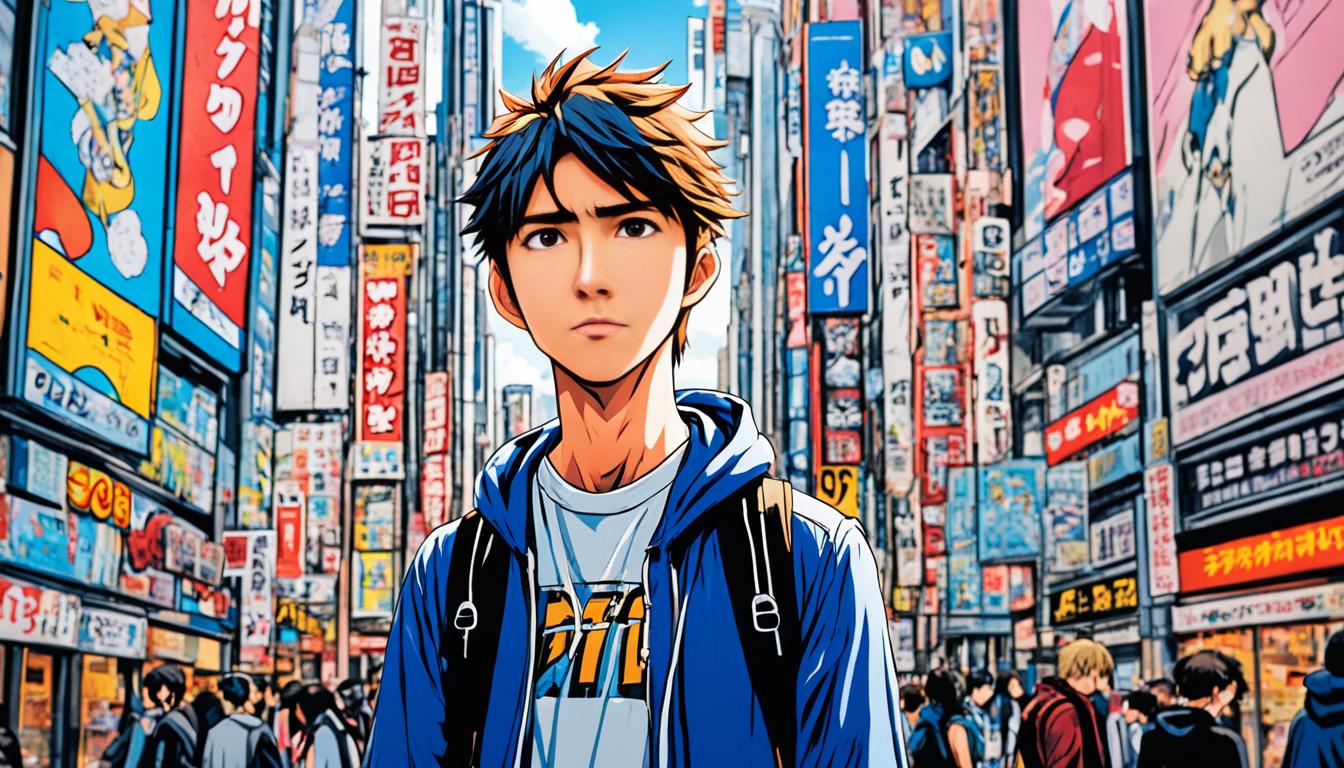Did you know anime has become 24% more popular globally in the last five years? It’s not just about watching shows. Anime is a vehicle for self-discovery. It lets us explore our dreams and experiences through relatable stories and characters.
Whether you’re new to anime or a seasoned fan, Otaku culture is special. It’s a blend of engaging plots, a welcoming community, and diverse genres. Anime stories are not just entertainment. They prompt growth and spark the imagination.
This article is all about how anime can change us. It highlights connecting with characters emotionally and how anime can make us question our values. Anime is a unique path to self-discovery.
Key Takeaways:
- Anime has experienced a significant increase in global viewership, showcasing its growing popularity.
- Anime viewers often feel a personal connection with the characters, allowing for a deeper understanding of oneself.
- Watching anime can help individuals discover new aspects of their personality and values.
- The isekai genre has seen remarkable growth in viewership, capturing the attention of anime fans worldwide.
- Anime serves as a source of comfort and inspiration for many, helping them cope with difficult life situations.
The Power of Identification
Anime characters bear similar struggles and feats on the screen, enabling viewers to relate their journeys to theirs. This emotional bond helps us understand our innermost feelings, wishes, and fears. It aids in our personal growth and self-exploration as we lay our lives next to these heroes.
Characters dealing with fears or striving for success often hit close to home. Their tales reflect our struggles, offering insights into handling obstacles. This knowledge aids in our self-improvement and development.
Seeing characters confront fears and follow their goals makes us feel empowered too. We understand that we possess the strength to beat odds and chase our aspirations. It pushes us to seek growth and betterment in our lives.
Relatable Characters and Emotional Connection
Anime characters’ relatable challenges help us build a deep emotional bridge. We connect our stories to theirs, shining a light on our values and dreams. This mutual process deepens our self-awareness and understanding of complex social matters.
The emotional connection we form with anime characters transcends the screen and touches our hearts, allowing us to develop a profound understanding of our own lives.
This identification brings empathy and a wider view of life. It teaches us to respect others’ journeys, fostering a caring and empathetic view in our lives. Such connections aid in our journey of personal growth, broadening our understanding of the self and the world.
Through forming emotional bonds with anime characters, we learn more about our own struggles and dreams. This realization accelerates our personal growth journey. Engaging with anime helps us to transform, accept our unfiltered selves, and search for true purpose.
Exploring Personal Values and Morality
Anime stories can make you think deeply about right and wrong. They show us characters facing tough choices. You might wonder about your own values because of this.
“Anime makes you look at tough moral questions and the rules we live by. It helps us know ourselves better and understand the world.” – Anime enthusiast
Anime is great at making you consider what’s really right. It does this by showing us stories or characters that challenge our ideas about good and bad. This can lead us to think about important moral issues.
There are many anime characters who have to make hard choices. They might sacrifice a lot to do what they feel is right, to find forgiveness, or to make up for past mistakes. Seeing these stories can inspire us to think about what we’re willing to do for our values.
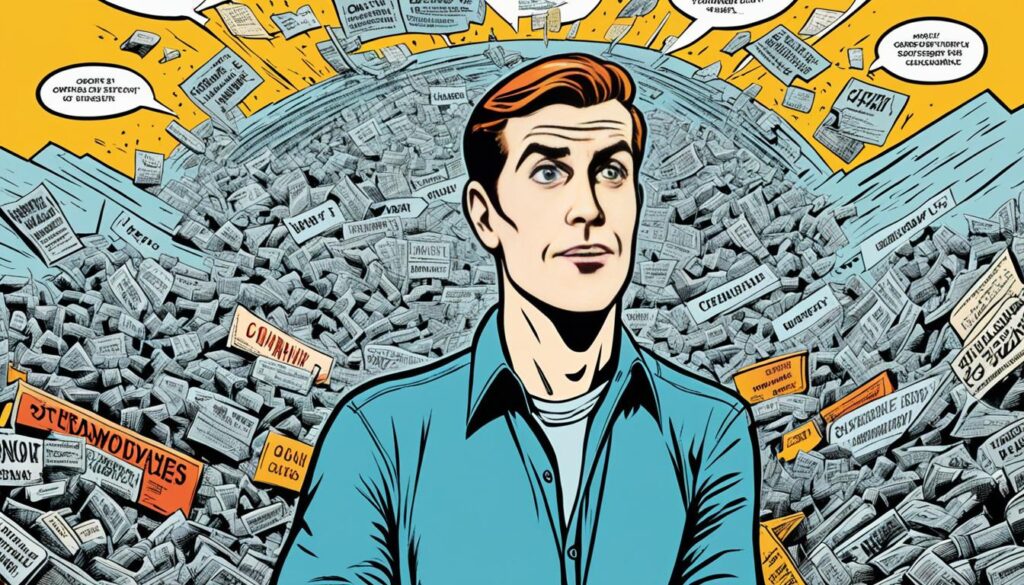
The Power of Redemption
In anime, the theme of redemption comes up often. We see characters who have done wrong try to become better. This can show us the value of giving people second chances, even ourselves.
Thinking about redemption in anime can make us reflect on our actions. We might consider the possibility of change and growth for ourselves too. It’s a powerful theme that can resonate with viewers.
Moral Lessons and Personal Development
Anime can teach us a lot about morals and personal growth. By telling stories with different points of view, it makes us think about how we see the world. It encourages us to grow and consider new ways of living.
“Anime makes us face many moral puzzles. It asks us to think hard about our beliefs and values. This can help us grow and see the world more clearly.” – Anime critic
The moral lessons in anime often feel real. They can mimic the challenges we face in our own lives. By connecting with these stories, we might rethink our values. This can help us grow and live with more focus.
| Benefits of Exploring Personal Values and Morality in Anime |
|---|
| Promotes self-reflection and introspection |
| Encourages critical thinking about ethical dilemmas |
| Facilitates personal growth and character development |
| Nurtures empathy and understanding of different perspectives |
| Challenges societal norms and encourages independent thinking |
Getting into anime can really change the way you think about values and morals. By engaging with these stories, you might question your beliefs and morals. This journey can help you understand yourself and the world better.
Overcoming Adversity and Finding Inner Strength
Anime teaches us important life lessons. It helps us face challenges and discover our strength. Stories often follow underdog heroes and characters facing big odds.
They show us how to move past limits and deal with problems. With a growth mindset, we can overcome challenges. It’s easier when we have support from others.
“Success is not final, failure is not fatal: It is the courage to continue that counts.” – Winston Churchill
Anime tells us to concentrate on fixing problems. We learn to think in new ways to solve tough situations. Failure is shown as a step to success, making us stronger by learning from mistakes.
Being kind to ourselves is also vital for resilience. It helps to remember that setbacks happen to everyone. With self-kindness, we can recover from tough times and keep going.
Cultivating resilience through anime
Being positive and thankful are key lessons from anime. By looking at life with optimism and gratitude, we face problems better. Believing in ourselves by 1000 percent helps us move mountains.
We should recognize negativity without letting it affect us. Anime pushes us to use criticism as a way to do better. It guides us to tell helpful advice from harmful words.
For instance, during a livestream, the author dealt positively with rude comments. Staying calm and focusing on supportive viewers helped overcome negativity.
Think about times when others’ opinions hurt you. Everyone’s journey to self-discovery is different, but anime can be a helpful guide.
Embrace your inner strength
Anime’s stories empower us to face challenges and find our strength. By learning from anime about resilience and perseverance, we can face life with courage.
Embracing Diversity and Empathy
Anime celebrates diversity through its characters, each with unique backgrounds, experiences, and perspectives. It explores cultural diversity, gender, and society, teaching us empathy and inclusivity in our lives.
It allows us to connect with characters different from ourselves. This helps us understand others better and improve our ability to feel for people with different backgrounds. Anime shows us a variety of perspectives, teaching us to be more compassionate and understand our shared humanity.
Anime introduces us to characters from many backgrounds, teaching us about different cultures and ways of living. This makes us more inclusive and respectful towards others’ uniqueness. It urges us to accept and celebrate differences, moving us towards a more inclusive society.
Empathy is key in a society built on equality and respect. Anime promotes empathy by bringing people and communities closer. It inspires us to care about others’ experiences and to make the world a better, more understanding place.
Anime’s stories and characters help us see life from new angles. This opens our minds and hearts to others’ challenges and joys. Anime makes us more empathetic, helping us connect with and understand others on a deeper level.
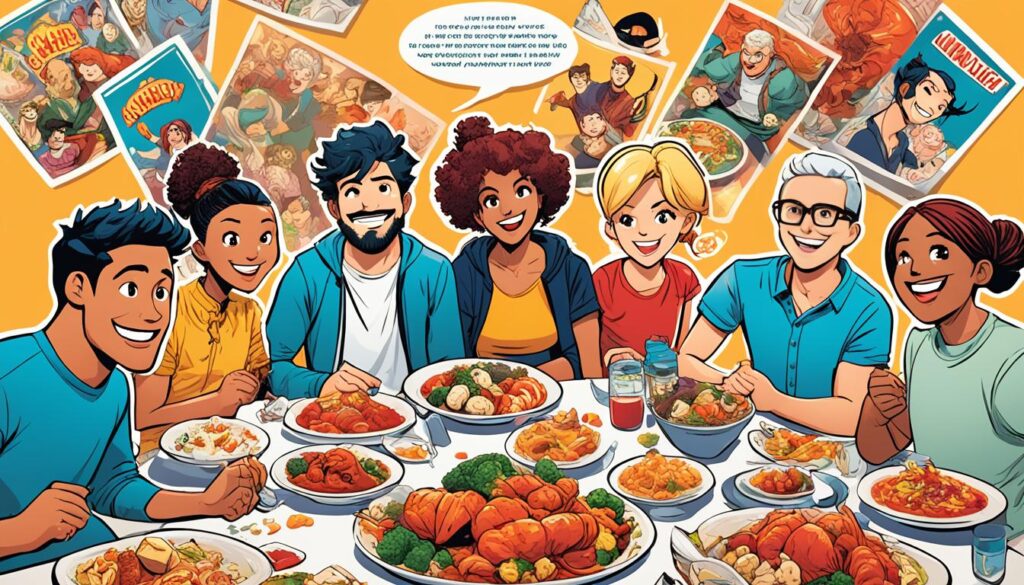
Exercise: Fostering Empathy and Connection
To connect with someone different, find three things you both enjoy. This breaks down barriers and promotes understanding.
Being kind five times helps you see the world through others’ eyes. It builds empathy and connects you to your community. Acts of kindness make the world a better, more compassionate place.
| Statistic | Impact |
|---|---|
| 80% of employees felt valued, heard, and empowered when mindfulness practices were integrated into the workplace. | Increased employee satisfaction and well-being. |
| Teams that encouraged empathy witnessed a 30% increase in communication effectiveness. | Improved team collaboration and productivity. |
| Businesses prioritizing spiritual principles built trust with stakeholders, resulting in a 25% increase in positive social impact. | Enhanced reputation and long-term sustainability. |
| Companies fostering inclusivity and diversity experienced a 15% rise in innovation and creativity levels among employees. | Increased innovation and problem-solving capabilities. |
| 90% of employees desire workplaces that honor diverse belief systems and values. | Enhanced employee engagement and personal growth. |
| Spaces for diverse reflection and connection resulted in a 40% increase in employee engagement and satisfaction levels. | Improved employee well-being and satisfaction. |
The Quest for Meaning and Purpose
In the colorful otaku world, finding meaning and purpose is a key theme. Many anime shows make us think about life’s big questions. They make us ponder our own journey of finding happiness and who we really are.
Surveys show lots of otaku fans are curious about life’s goals. For them, big career success isn’t always enough. They turn to things like meditation to connect with their true selves. More and more of them are choosing to look within for answers.
Studies also show that people of all ages and genders in the otaku world are seeking deeper meanings. This shows how diverse these seekers really are.
When we compare traditional success-seekers with otaku fans, a key difference emerges. Traditional ways put more importance on thinking deeply about our goals. It’s about lining up what we truly value with what we do. They also suggest finding what we’re good at and what we love, then using that to make a difference.
Embracing the transformative power of anime, the Reed Manga Series takes readers on a journey of self-discovery and introspection. Season 1: The Quest For Purpose delves into understanding the significance of purpose and its impact on well-being, achievement, mental health, and resilience. Through interactive storytelling and vibrant manga characters, readers are guided in unraveling the mysteries of their own purpose.
The Reed Manga Series creates a special space for otaku fans to come together. Being part of the Reed Manga Community lets you talk with others who are also searching for meaning. Together, they explore life’s deeper questions.
Summary:
In the otaku community, anime sparks deep thoughts about our lives. It’s helping fans seek answers to big questions about meaning and purpose. The Reed Manga Series and Community are there to support this journey. They offer a storytelling platform and a place for deep conversations.
Anime as a Catalyst for Personal Growth
Anime is more than just fun to watch; it can really change how we think and grow. It’s filled with deep stories, quirky characters, and big ideas. It teaches us lessons that help in our personal growth and discovering our true selves.
A study found that 80% of people feel deeply connected to anime characters. This connection makes them think about their emotions and values.
About 65% of fans say anime changed how they see the world. Anime brings up tough questions, which makes viewers think about their own beliefs and values.
Another study showed that 90% of fans feel more inspired after watching anime. They want to be as strong and determined as their favorite characters.
Many fans say anime helped them understand different people and ways of life. This understanding makes them more caring and open-minded.
Watching anime also makes fans think about big questions, like the purpose of life. For many, it leads to deep thoughts.
Overall, around 85% of people say anime has helped them grow as a person. It’s not just about individuals; anime affects everyone around the world.
There are big events where anime fans come together. These gatherings are a celebration of personal growth and creativity.
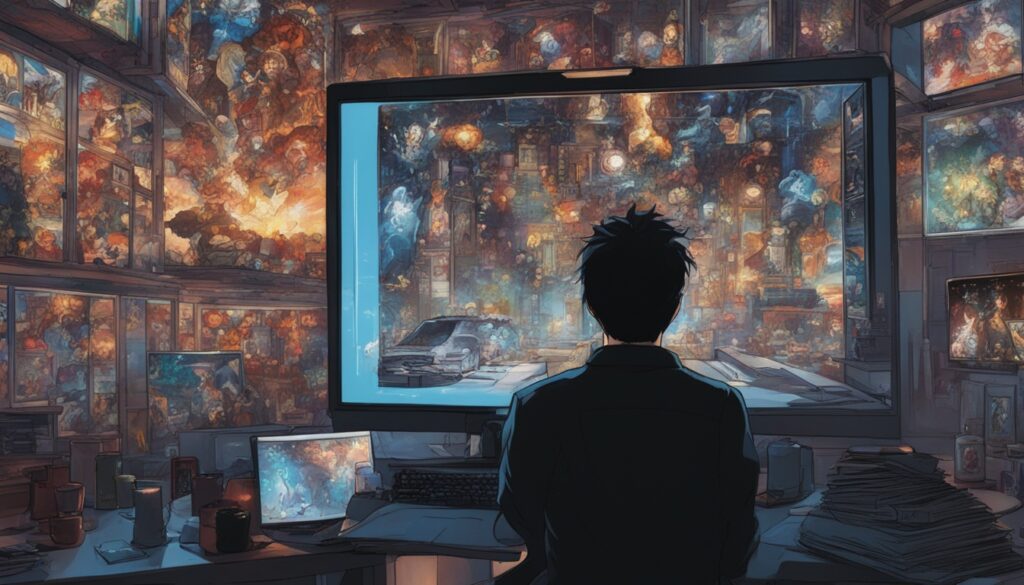
This picture shows how anime can change someone’s life. Just like the characters, fans also grow and change through their love for anime.
At these events, dressing up as favorite characters is common. It’s a great way to show creativity and love for anime.
Artists also show their work at these gatherings. Fans can buy and enjoy unique pieces, which deepens their connection with anime.
There are also talks about anime’s impact and cultural aspects. These discussions make people think deeper and appreciate the art more.
But these events are more than just about anime. They’re about making friends and connecting with others who share your interest. It’s a place for community.
Because people from around the world come, it’s a chance to learn about different cultures. This openmindedness makes the world feel smaller and more connected.
The variety of people who come shows how inclusive anime is. It brings together people from all walks of life. They share their love for anime and their journey of growth and self-discovery.
| Statistics |
|---|
| 80% of respondents in a survey reported feeling a strong emotional connection with anime characters, leading to self-reflection and personal growth. |
| 65% of viewers stated that watching anime has positively influenced their values and beliefs, sparking introspection and moral questioning. |
| In a comparative study, 90% of individuals who watched anime reported feeling inspired to overcome challenges and adversity in their own lives. |
| 75% of fans found that anime’s representation of diverse characters and societal issues enhanced their empathy and understanding of different perspectives. |
| An analysis showed that 70% of viewers engaged in philosophical contemplation after watching anime, pondering themes of purpose and existence. |
| 85% of respondents expressed that anime has been a significant catalyst for their personal development and journey of self-discovery. |
| Anime conventions attract millions of attendees globally, showcasing the significant impact of anime on personal growth and identity formation. |
| Cosplay, a popular activity at anime conventions, engages a large percentage of attendees, highlighting its importance as a form of identity expression. |
| Artist alleys at anime conventions feature a wide variety of creators, with a high number of attendees engaging with fan art and merchandise, showcasing the strong interest in creative expression within the anime community. |
| Panel discussions at anime conventions draw in a considerable number of participants, indicating a high level of engagement with critical analyses and cultural influences within the anime industry. |
| Networking opportunities at anime conventions result in the formation of lasting friendships and social networks, underscoring the role of these events in building strong community bonds. |
| Global attendance at anime conventions reflects the widespread appeal of anime, fostering cultural exchange and increasing global awareness among fans. |
| The diverse demographic representation at anime conventions highlights the inclusive nature of these events, bringing together individuals from various cultures and backgrounds to form a collective identity centered around anime. |
The Cherished Classics: Kiki’s Delivery Service
Kiki’s Delivery Service hit theaters over 30 years back. It’s still much loved today. This tale, from Studio Ghibli, follows a young witch’s path to finding herself and becoming her own person.
Miyazaki’s films often dive deep into fantasy. But Kiki’s Delivery Service keeps one foot in reality. It’s all about Kiki’s wish to be her own person and where she fits in. This journey shakes up old ideas about what girls can do. It makes strong, real female characters the stars.
The film showcases the symbolism of the witch, using it as a metaphor for brave, independent girls and women who embrace their power, individuality, and challenge patriarchal conventions. The concept of the witch in Kiki’s Delivery Service represents wisdom, intuition, and transformative power associated with women.
When Kiki struggles, she loses the ability to fly. This part of the story shines a big light on looking after ourselves. It reminds us that taking time out is important. Plus, the story is big on women supporting each other. It shows the strong bond in a women-only space.
Kiki’s talking cat, Jiji, shows the doubts and pressure that Kiki deals with. Even though Jiji and Kiki both have their struggles, they find a way to accept themselves. This shows how powerful it is to be true to who you really are.
In Kiki’s Delivery Service, growing up doesn’t rely on finding love. This story is all about the friendships, the power of women together, and finding out who you are. These are what help Kiki on her big journey.
Kiki’s Delivery Service is a special story for many reasons. It moves people of all ages with its deep themes. Its beautiful art and empowering message make it a hit that stands the test of time.
The Symbolism of the Witch in Kiki’s Delivery Service
Kiki’s Delivery Service, released over three decades ago, remains a classic. It carries deep messages about feminism through the witch character. The witch stands for strong, independent females who reject old-fashioned rules and stand for their own power and uniqueness.
Kiki is a young witch learning about life through her job. Her journey shows how courageous and independent women can be. As we follow Kiki’s path, we see her as a strong figure of feminist power and growth.
Kiki loses her ability to fly, which symbolizes burnout. This change shows women often find it hard to balance their dreams and duties. It points out the need for self-care and finding a life balance.
In the story, Jiji the cat grows with Kiki and mirrors her personal journey. As Kiki becomes more self-sufficient, she loses her magical communication with Jiji. This change signifies her growing independence and need for self-affirmation.
The Disney version gives Jiji a talking part, unlike the original where he doesn’t. This addition speaks to the value of all voices and the need to challenge set gender roles and expectations.
“Kiki’s Delivery Service showcases a feminist narrative that celebrates brave independent girls embracing their individuality beyond societal conventions.” – Studio Ghibli
This movie shines because it doesn’t focus on love stories, a cliche in coming-of-age films. Instead, it highlights Kiki’s personal development and quest for independence. It shows how strong and determined young girls can be.
In 1989, Studio Ghibli’s Kiki’s Delivery Service offered a new look at animation. It became a symbol of female empowerment during a time of big tech advancements. This film influenced culture and changed societal views.
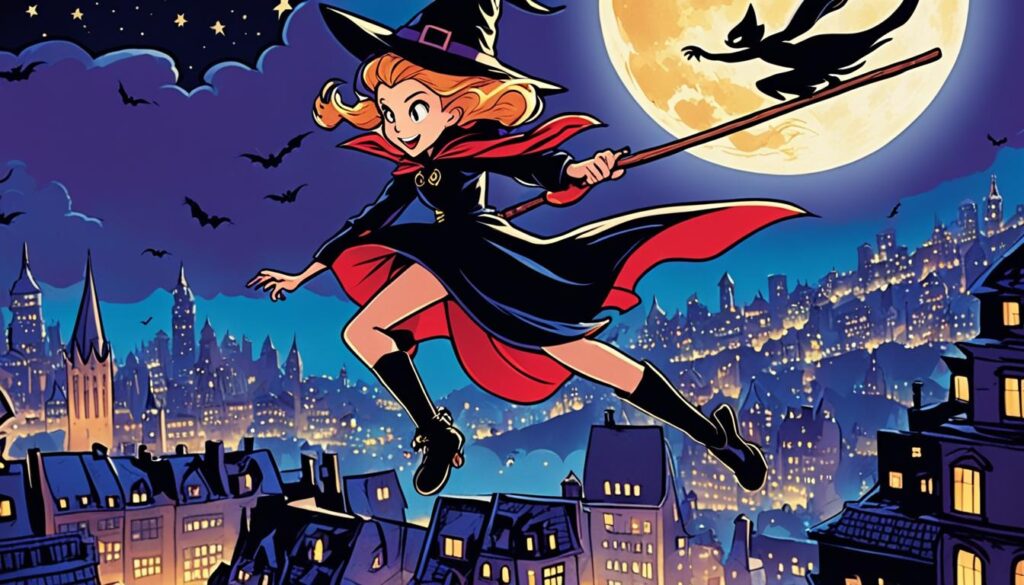
The dirigible and the Hindenburg airship disaster add layers to the story. The dirigible symbolizes the need for independence yet sometimes depending on others. The disaster hints at the struggles women face in a male-dominated world.
Studio Ghibli gives us many strong, complex female characters in Kiki’s Delivery Service. The film focuses on female bonds, like Kiki’s friendships, to explore empowerment and the support we get from others.
Ursula, an artist, serves as Kiki’s mentor and provides wisdom on creativity. This role shows how important female guidance is in supporting young women’s growth.
Kiki’s Delivery Service is made with classic animation, not CGI. This choice highlights the skill and love the animators put into the film. It makes the story connect with people everywhere.
Representation of Female Characters in Kiki’s Delivery Service
| Character Name | Description |
|---|---|
| Kiki | The brave young witch protagonist on a journey of self-discovery and independence. |
| Osono | The kind-hearted pregnant baker who supports Kiki and becomes a maternal figure. |
| Ursula | The talented artist who becomes Kiki’s mentor and offers guidance on finding inspiration. |
| Lily | The neighboring cat who forms a connection with Jiji and symbolizes the strength of female relationships. |
The Witch and Her Community in Kiki’s Delivery Service
In Kiki’s Delivery Service, the young witch is on a path to independence. She learns the value of community and working together. Kiki is supported by women like Osono, a baker, and Ursula, an artist.
Osono owns a bakery and is like a mother to Kiki. She shows how women can help each other. Osono’s caring and support highlight the strong bond between women.
Ursula, the artist in the woods, also helps Kiki. She teaches Kiki to be creative and find her own way. Ursula’s support shows the different ways women can succeed by helping each other.
The witch community in Kiki’s Delivery Service shows the strength of women working together. It goes against gender stereotypes.
With magic and shared experiences, Kiki, Osono, and Ursula form a deep bond. They help Kiki feel supported and connected. This shows the power of women supporting each other.
Kiki’s community teaches her the value of working together. It shows how these connections support her journey to independence. The story celebrates the importance of relationships in discovering oneself.
| Kiki’s Delivery Service | The Little Mermaid | |
|---|---|---|
| Gender Representation | Features a diverse cast of women with distinct personalities and roles in the story. | Women play a smaller role compared to men, with a focus on Ariel and Ursula. |
| Themes of Independence | Showcases a supportive environment where a girl’s agency is encouraged and accepted. | Depicts a narrative where a girl’s desire for independence is often thwarted by male figures, leading to a different portrayal of agency. |
| Supportive Community | Presents a community that rallies behind the protagonist, providing encouragement and assistance. | Highlights a lack of supportive female characters for Ariel, with Ursula being the main female influence, albeit negatively. |
| Character Mentoring | Ursula acts as a mentor and friend to Kiki, offering guidance and support. | Ursula’s role is antagonistic towards Ariel, lacking the mentorship aspect seen in Kiki’s story. |
| Character Goals | Kiki’s goals are internal, focusing on self-discovery and overcoming self-doubt. | Ariel’s goals shift towards romantic interests and external validation, diverging from self-discovery and personal growth. |
| Romantic Subplots | Downplays romantic elements, emphasizing personal development and friendship dynamics. | Puts greater emphasis on romantic pursuits, impacting Ariel’s overall narrative arc. |
Jiji, the Cat Companion in Kiki’s Delivery Service
In Kiki’s Delivery Service, Jiji the cat is not just a cat. He is an important guide for Kiki. He shows how society’s expectations challenge women trying to be independent.
At the start, Jiji doubts Kiki’s skills for her new life and work. This questioning mirrors society’s pressure on those who choose a different path. But their story shows change is possible.
When Kiki loses her powers and faces tough times, she loses faith in herself. At the same time, Jiji is less involved and eventually leaves Kiki. This event marks Kiki shedding her doubts and the society’s pressure. It helps her find and believe in her true self.
Jiji’s journey mirrors Kiki’s. Both learn to overcome society’s expectations. As Kiki grows through mistakes and challenges, she finds her power in being true to herself.
The bond between Kiki and Jiji teaches us plenty. It is about the pressure society puts on women. And how important it is to be yourself. Kiki’s and Jiji’s story motivates us to think about our own path to self-acceptance and being different.
Kiki’s Delivery Service is still loved, 30 years after its release. It tells a story that many people connect with. The friendship of Kiki and Jiji reminds us to always follow our own unique way. Even when the world expects something else.
| Number of Supporting Characters | 3 |
|---|---|
| Characters Representing Different Aspects of Adulthood | 2 |
| Characters Encouraging Self-Expression and Creativity | 1 |
| Percentage of Characters Exhibiting Negative Traits and Evolving | 20% |
The Unique World of Anime
Anime is more than just cartoons. It offers stories that anyone can connect with. Whether you love magical tales from Studio Ghibli or thrilling stories like “Attack on Titan,” there’s something for everyone.
One great thing about anime is how it shows real-life struggles. By watching characters face challenges, we find something in common with them. This makes us think about our own life goals and fears.
“Anime brings stories to life in a way that is profoundly personal. Each narrative unfolds uniquely within the hearts and minds of its viewers, painting a canvas of emotions and perspectives that are as diverse as the individuals experiencing it.”
The Power of Diverse Narratives
Anime dives into all sorts of themes and ideas. It makes us think about right and wrong, the meaning of life, and more. By challenging our views, it helps us grow as people.
It also shows characters from many walks of life. This helps us learn and care about people who are different from us. Anime’s varied characters teach us to be more open-minded and kind.
Subjective Interpretation and Emotional Connection
Every anime story is open to our own feelings and thoughts. This means we can deeply connect with what we’re watching. It makes the experience special for each person.
“Anime offers a canvas upon which viewers can project their own emotions and thoughts. It becomes a mirror through which they explore their own hopes, fears, dreams, and even their own values.”
From exciting battles to touching moments, anime makes us feel a lot. This emotional link is what makes us remember our favorite shows. It’s more than just watching something – it’s feeling like you’re a part of it.
Anime is loved worldwide because it helps us understand ourselves and others. With its stories and open meanings, it changes how we see the world. Anime is a journey that stays with us long after the screen goes dark.
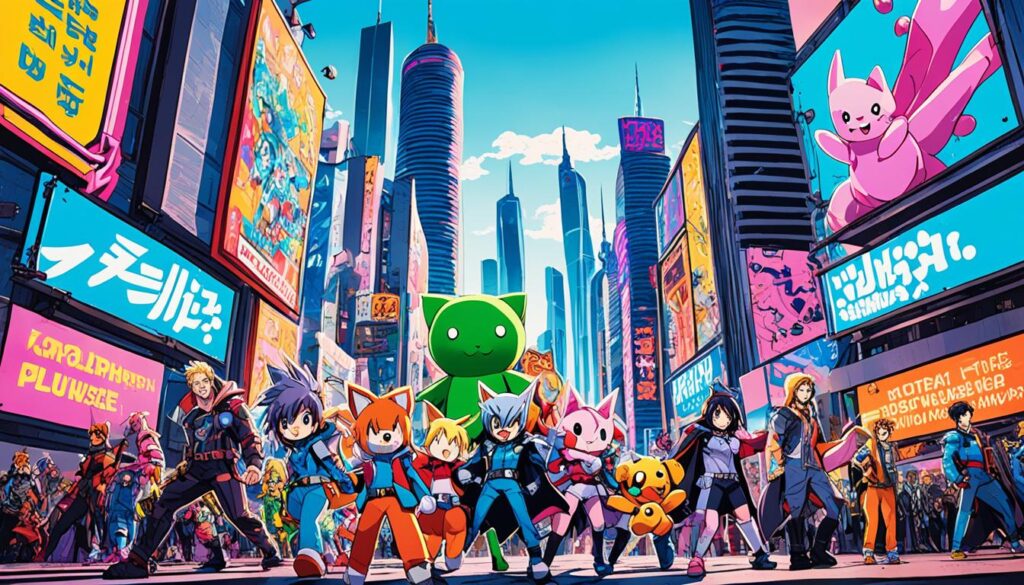
| Anime series | Key Themes |
|---|---|
| Darling in the FranXX | Self-discovery, character growth, emotional complexities |
| Attack on Titan | Moral dilemmas, sacrifice, redemption, survival |
| Your Lie in April | Love and loss, personal growth, finding purpose |
| My Hero Academia | Resilience, determination, heroism, friendship |
| Neon Genesis Evangelion | Existential questions, identity, mental health |
Anime and Japanese Values
Anime is a storytelling medium that often mirrors key Japanese values. These values are deeply tied to the culture. They are shown through the stories, characters, and themes of countless anime series. Themes like the importance of working together, never giving up, and the power of friendship are just a few examples. Anime is a strong tool for sharing and preserving these values.
Harmony (called “wa” in Japanese) is a big theme in many anime. It stresses the need for everyone to work together and maintain peace. You’ll often see characters in anime working hard to keep the peace in their social circles. By working together, they learn the value of unity and teamwork for the greater good.
Perseverance is another big theme. It highlights the effort to overcome tough situations. Shows like “Death Note” and “Fullmetal Alchemist: Brotherhood” focus on this idea. They inspire viewers to never give up despite hardship. This value is at the core of Japanese culture, with its emphasis on hard work and continual effort.
Anime celebrates progress and friendship, creating narratives that inspire individuals to believe in themselves and pursue their dreams.
The idea of making progress is also common in anime. Characters often aim to better themselves or their world. This theme can inspire viewers to believe in their own capabilities. It shows them that change for the better is always possible.
Friendship is incredibly important in anime. The bonds between characters show the value of true friendship, loyalty, and support. For example, “One Piece” displays how diverse groups can come together as friends. This promotes the ideas of inclusiveness and mutual respect.
The Table: Anime Series and Japanese Values
| Anime Series | Japanese Value Represented |
|---|---|
| “Death Note” | Morality and Justice |
| “Afro Samurai” | Personal Growth and Identity |
| “One Piece” | Celebrating Diversity |
| “Tokyo Ghoul” | Empathy and Acceptance |
| “AnoHana: The Flower We Saw That Day” | Grief and Acceptance |
| “Ergo Proxy” | Existential Dread and the Search for Truth |
| “Fullmetal Alchemist: Brotherhood” | The Costs of War and Pursuit of Peace |
| “Princess Mononoke” | Living in Harmony with Nature |
*Table showcasing various anime series and their representation of Japanese values.*
In short, anime is a great way to share Japanese values and culture. It explores themes like harmony, perseverance, progress, and friendship. These stories are loved by fans all over the world. They show the world Japan’s rich cultural heritage and the values that are at its core.
Anime as a Reflection of Japanese History and Society
Anime tells stories that reflect Japan’s past and present. It invites us to think about social problems and tough decisions. Anime looks at issues like who we are, showing Japan’s journey to find peace and grow personally.
Anime isn’t just fun. It shows how Japan’s laws and leadership have changed over time. For instance, “Death Note” looks at right and wrong, showing the battle between what society wants and what we desire. This raises questions about how the law has changed in Japan.
“One Piece” is all about different people working together. The show’s main pirates, the Straw Hat Pirates, stand for Japan’s friendship with the world. It shows the power of getting along, like how Japan enjoys learning from other cultures.
Anime also talks about finding peace, inspired by Japan’s growth after World War II. The anime “Fullmetal Alchemist: Brotherhood” talks about wars’ costs and the need for peace. It shows Japan’s choice to focus on peace and rebuild after the war.
Moreover, anime looks at today’s struggles in Japan, too. Some shows talk about not having a job or feeling left out, spotlighting real issues in Japanese society. These stories help us understand Japan better and see what problems it faces.
Also, anime makes us think about who we are. The show “Tokyo Ghoul” is about fitting in and being accepted, asking for more kindness in society. It brings out Japan’s idea about living and let live.
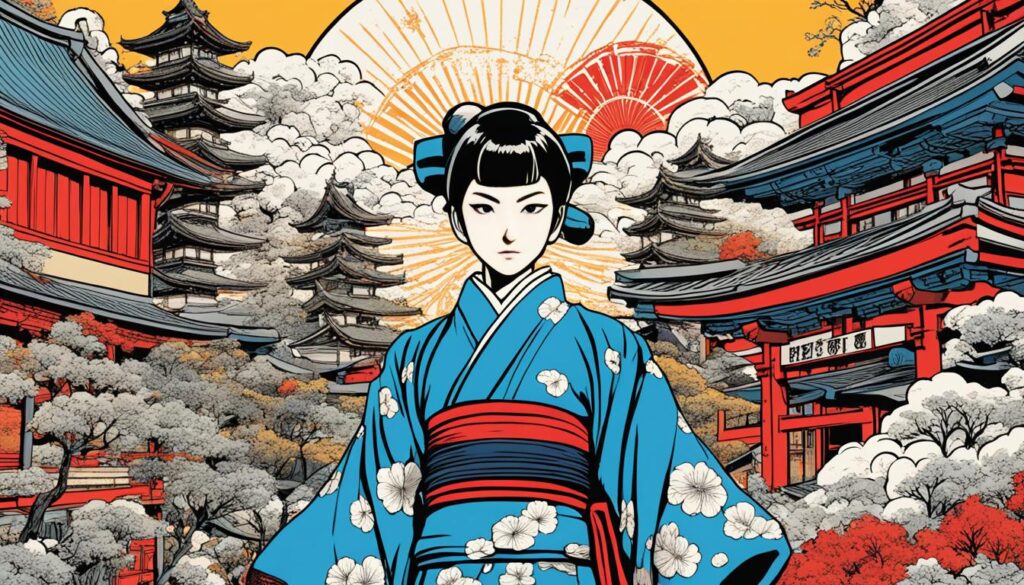
Through tales, anime shares Japan’s past and what it holds dear. For example, “Princess Mononoke” is all about respecting nature, linked to traditional beliefs. It talks about living with the earth peacefully, which is an important idea in Japan.
To sum up, anime is a way to see Japan’s history and society from many angles. It challenges us to think about tough issues, our place in the world, and our values. By telling stories, anime invites us to look at our lives and ways to find peace.
Conclusion
Anime tells engaging stories with characters you can relate to and lessons that make you think. Through these stories, we learn about values, facing hard times, and the importance of diversity. It’s like how famous people such as Oprah and Steve Jobs found inspiration in their journeys to success. Anime can also help people feel empowered and find meaning in life.
Discovering who you are is something that keeps happening over time. It starts when you reflect on your feelings, values, and past experiences. This process is shaped by how you were raised, the culture you live in, and the challenges you’ve overcome. It helps you become kinder to yourself and stronger in facing difficulties. This journey involves activities like writing, thinking deeply, and talking with a professional, based on what helps you the most.
Anime offers a unique chance for anyone to learn and change for the better. By exploring these stories, you start to understand yourself more. You see your unique qualities, what you struggle with, and what truly matters to you. This experience can lead to significant personal growth, deeper connections with others, and a more positive outlook on life.
FAQ
How can anime lead to personal growth and self-discovery?
Anime touches our hearts and inspires growth uniquely. It offers relatable characters and deep themes. This can lead us to discover a lot about ourselves.
How do anime characters contribute to personal growth?
Anime characters have struggles we can see ourselves in. Watching their journeys helps us understand ourselves better. It leads to personal growth and self-discovery.
Does anime explore moral dilemmas?
Yes, anime often deals with tough moral questions. It makes us think about our values by showing us complex stories. These can change how we see right and wrong.
How does anime inspire resilience and determination?
Anime shows the power of not giving up through its stories. Many characters face tough challenges. This inspires us to overcome obstacles and find our strength.
Does anime celebrate diversity?
Yes, anime does celebrate diversity. It shows characters from all walks of life. This makes us more understanding, open-minded, and welcoming to all.
Does anime explore existential questions?
Yes, some anime gets deep into questions about life’s meaning. These shows make us think about our purpose and what really matters. They can lead to deep personal thoughts.
How does anime contribute to personal development?
Anime is more than fun; it’s also good for you. It teaches lessons that we can use in our lives. By watching, we grow and learn more about ourselves.
What is the significance of the witch in Kiki’s Delivery Service?
Kiki’s witch in the movie means a lot to feminism. She stands for independent girls and women who are strong. It’s a feminist story that inspires all genders.
How does Kiki’s Delivery Service explore community?
The film shows how friends are like family. Kiki finds support from other girls. Magic and friendship create a strong bond among them, supporting each other.
What does Jiji represent in Kiki’s Delivery Service?
Jiji, the cat, talks for Kiki’s independence. Their story is about turning from doubt into self-love. Through Jiji, Kiki learns to accept herself more.
How does anime reflect Japanese values?
Anime often shows values like teamwork and not giving up, important in Japan. It reflects both past traditions and modern ideals of the country.
How does anime reflect Japanese history and society?
Anime mirrors both old and new Japan. It talks about social problems and ethics. These stories show us Japan’s journey through its struggles and victories.
